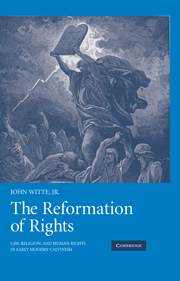Book contents
- Frontmatter
- Contents
- List of illustrations
- Preface and acknowledgments
- List of abbreviations and references
- Introduction
- 1 Moderate (religious) liberty in the theology of John Calvin: The original Genevan experiment
- 2 The duties of conscience and the free exercise of Christian liberty: Theodore Beza and the rise of Calvinist rights and resistance theory
- 3 Natural rights, popular sovereignty, and covenant politics: Johannes Althusius and the Dutch Revolt and Republic
- 4 Prophets, priests, and kings of liberty: John Milton and the rights and liberties of Englishmen
- 5 How to govern a city on a hill: Covenant liberty in Puritan New England
- 6 Concluding reflections: The biography and biology of liberty in early modern Calvinism
- Bibliography
- Index to biblical sources
- Index
Preface and acknowledgments
Published online by Cambridge University Press: 05 February 2015
- Frontmatter
- Contents
- List of illustrations
- Preface and acknowledgments
- List of abbreviations and references
- Introduction
- 1 Moderate (religious) liberty in the theology of John Calvin: The original Genevan experiment
- 2 The duties of conscience and the free exercise of Christian liberty: Theodore Beza and the rise of Calvinist rights and resistance theory
- 3 Natural rights, popular sovereignty, and covenant politics: Johannes Althusius and the Dutch Revolt and Republic
- 4 Prophets, priests, and kings of liberty: John Milton and the rights and liberties of Englishmen
- 5 How to govern a city on a hill: Covenant liberty in Puritan New England
- 6 Concluding reflections: The biography and biology of liberty in early modern Calvinism
- Bibliography
- Index to biblical sources
- Index
Summary
Over the past three decades, a veritable cottage industry of important new scholarship has emerged dedicated to the history of rights talk in the Western tradition prior to the Enlightenment. We now know a great deal more about classical Roman understandings of rights (iura), liberties (libertates), capacities (facultates), powers (potestates), and related concepts, and their elaboration by medieval and early modern civilians. We can now pore over an intricate latticework of arguments about individual and group rights and liberties developed by medieval Catholic canonists, philosophers, and theologians, and the ample expansion of this medieval handiwork by neo-scholastic writers in early modern Spain and Portugal. And we now know a good deal more about classical republican theories of liberty developed in Greece and Rome, and their transformative influence on early modern common lawyers and political theorists, eventually on both sides of the Atlantic.
This volume tracks the development of rights talk in those parts of the Western tradition inspired by the teachings of the Genevan Reformer, John Calvin (1509–1564). Building in part on classical and Christian prototypes, Calvin developed arresting new teachings on authority and liberty, duties and rights, and church and state that have had an enduring influence on Protestant lands. Calvin's original teachings were periodically challenged by major crises in the West – the French Wars of Religion, the Dutch Revolt, the English Revolution, American colonization, and the American Revolution.
- Type
- Chapter
- Information
- The Reformation of RightsLaw, Religion and Human Rights in Early Modern Calvinism, pp. xi - xiiiPublisher: Cambridge University PressPrint publication year: 2008



